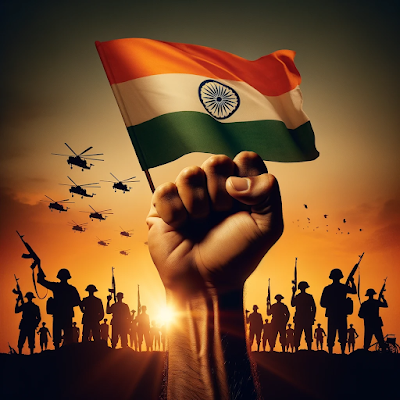Indian Freedom Fighters — Were they someone’s terrorists?
In the wake of the heinous event of October 7th and the aftermath that followed, we are continually horrified by the news emerging from Israel and Gaza. Imagine how terrible it is for the people who are the news, living in that hellish condition on either side of the conflict. We, Bengalis, have a long tradition of meeting over the weekends — adda — and spending time having tea and trying to solve world problems. These often lead to severe argumentation. I guess fellow Bengali esteemed Prof. Amartya Sen, Noble Laurate, also pointed to this tradition in his book The Argumentative Indian (ISBN: 978–0312426026). So the topic came up whether the Indian Revolutionaries fighting against the British Raj were haloed freedom fighters or despicable terrorists. I am no historian, so with limited knowledge and coming from a family of “Indian Freedom Fighters,” I will attempt to rationalize why within a scope, the Indian revolutionaries were not terrorists by today’s definition.
In the annals of history, the nomenclature of ‘terrorist’ and ‘freedom fighter’ often pivot on the axis of perspective. However, when delving into the Indian struggle for independence against the British Raj, especially focusing on Bengali and Punjabi revolutionaries post-1900, the line between these terminologies becomes significantly pronounced.
To clarify, I won't be discussing the Sepoy Mutiny of 1857 since it was a revolt against the British East India Company by the Sepoys, who were their employed armed forces, and not against the British Crown. India was not yet subjugated or colonized by the British Government during this time. Additionally, many independent states also participated in the mutiny. Instead, my focus will be on the Bengali revolutionaries who abandoned the nonviolence movement as advocated by Mahatma Gandhi, and took up armed resistance against the British Raj's occupation. Most of these leaders were influenced and inspired by the philosophies and outcomes of the American Revolution, which took place almost a century and a half earlier.
The Indian armed revolutionary movement against the British Raj saw a profound engagement from the Bengali and Punjabi diaspora. These individuals were often educated and were driven by a profound sense of patriotism and the desire to free their motherland from colonial shackles. Unlike the often brutal and indiscriminate tactics associated with terrorism, these revolutionaries adhered to a code of ethics in their fight against oppression.
A pivotal distinction lies in the target of their resistance. I can speak for Bengali revolutionaries due to some familial heritage. These Bengali revolutionaries, akin to their counterparts from other regions, primarily targeted the symbols and agents of colonial oppression, such as government officials, police officers, and military installations. Their modus operandi significantly veered away from causing harm to British civilians or engaging in heinous acts such as rape or the killing of innocents, which are tactics often associated with terrorism.
The Indian revolutionaries were fighting against a colonial power that sought to subjugate and exploit their homeland. The British Raj, on the other hand, often engaged in violent suppression, exploitation, and racial subjugation, which by modern standards could be construed as state-sponsored terrorism. This stark contrast further distances the actions of Indian revolutionaries from the label of terrorism.
The context in which the Bengali revolutionaries operated was one of fighting against tangible oppression, with clearly defined goals rooted in liberty, equality, and self-determination. Their struggle was not aimed at instilling fear or chaos amongst civilians but was a fight for justice and freedom against a colonial power that sought to exploit and subjugate.
There were exceptions and British civilians were killed unintentionally as in the case of Khudiram Bose (https://en.wikipedia.org/wiki/Kshudiram_Bose). There were some factions, who operated outside of these ethical boundaries and sometimes for their own narrow material goals, and I have no shame about calling them terrorists. These were minorities among the Indian armed revolutionaries fighting for freedom during from 1890 till independence in 1947.
The actions of Indian revolutionaries, particularly the Bengali diaspora, against the British Raj, transcends the simplistic binary of ‘terrorist’ versus ‘freedom fighter’. Their fight was a nuanced and ethical resistance against a colonial power, thus carving out a legacy of heroism rather than terror. The narrative of these revolutionaries serves as a testament to the complex nature of anti-colonial struggles and the importance of viewing such historical events through a lens that honors the quest for justice and freedom over reductive labeling.
I hope I am able to answer my friends who use the same optics and overtly simplify facts to categorize every historical event as such.



Perhaps another way to differentiate is to establish that from the evidence you have presented, Sanjay, the freedom fighters did not subscribe to the terrorist's credo of "The end justifies the means". That particular credo has been used repeatedly by what are nowadays described as terrorists, and is basically an adjunct to consequentialism. Within the ethical theory of consequentialism, the consequences of any action completely decide the morality of the action, without regard to any other factors.- an essence of Machiavellian thinking as well. The abhorrent attack on the innocents by Hamas contrasts sharply with the actions of the Bengali freedom fighters. True, there will always be a certain number of greedy individuals who will always see, in any discord, an opportunity for personal gain and implement their own version of the end justifying the means. The difference there though is that in the latter group, the end benefits only one individual or a very small group in size, by comparison to the central and original cause supporters - rather than those who were in need due to injustice or prejudice, and for whose greater benefit the revolt or dissidence was originally started.
ReplyDelete